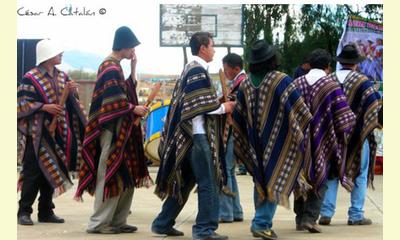|
|
Wilfredo Camacho: Professor of Andean Culture [Bolivia]
an article by Los Tiempos, Bolivia
There is a certain passion in certain men when they discover they have lost their culture, and suddenly they undergo a rebirth of memory in order to avoid further distress to their personal and collective identity. "Allin p'unchay tukuy qankunapaj" - it's a good day and it's good to be in this place," translates Professor Wilfredo Camacho at the start of our conversation. Professor Camacho studied philosophy at the UCB, and then immediately dedicated his life to a honorable journey to find the roots of his ancestors.

Cochabamba. La Loma. Festival of “Pachi Pachamama Pascuaricusunchej”. Photo copyright: César A. Catalán
click on photo to enlarge
"I'm Quechua and we have the saying - Noqa parlani qhechwata and noqa anchata kusikuni maymanta noqa jamuni: I am Quechua and I feel proud of where I came from. To be Quechua means that one is 'llank'ador' a man who really works, with much vocation in service to our brothers and with the exquisite languages such as Quechua, Cariñoso and Misk'i." The Professor expresses himself without minimizing the other cultural identities of Bolivia.
This is not a theoretical abstraction. Wilfredo Camacho, has promoted cultural change in Cochabamba through two days of great value for their specific effects: the Manka Ñawpa Mikhuna (Food of our grandparents) and the Wallunk'a and Mast'aku, which follows the festivals devoted to falling in love, to life and death, cultural spaces where citizens recover their traditions and enjoy the pleasures of the palate and the festival.
He considers that our ancestors, through their sharing of food, were prone to a more convivial life. We are losing the memory of what we once were.
"There are deep traits of racism, of discrimination in Cochabamba society keeping in mind that we are in a Plurinational State where inclusion is claimed, but not put in practice. In the universities and other educational centers, there are persistent traits of racision. But that's because there is not a real plan of educational and cultural revitalization to reverse these elements of discrimination and phobias, "emphasizes Professor Camacho.
Without doubt, in the spaces that are the most challenging for socialization, there are forms of violence that are starkly evident.
Therefore, there is no doubt for even a moment that it is urgent to construct a culture of peace:
"It is imperative in the current moment to promote the Culture of Peace. First of all, in our families. Be conscious of what was the Culture of Peace of our grandparents. Let there be a dialogue of peace, an intercultural dialogue. We are going to enter into a new educational system under the education law named after Avelino Siñani and Elizardo Pérez; therefore we need a course handbook that promotes the culture of peace. From kindergarten through primary and secondary. Making culture of peace a philosophy of life."
It is evident that fundamentally the culture of peace should strengthen intercultural dialogue so that we can recover our traditions and illuminate, explain and encourage them in the present time.
(Click here for a Spanish version of this article)
|








|
DISCUSSION
Question(s) related to this article:
The understanding of indigenous peoples, Can it help us cultivate a culture of peace?
* * * * *
Latest reader comment:
Two articles in recent years in CPNN point to the renewed recognition of the importance of indigenous knowledge and traditions to help save us from the ecological disaster of the global industrialized economy.
In the article preparing for the upcoming People's Summit in Rio (See CPNN April 12, 2012), Fabiola Ortiz emphasizes the importance of involving indigenous peoples in the decision-making about development projects.
The indigenous peoples of the Amazon made this argument very dramatically and eloquently in person at the World Social Forum in Belem, Brazil, as described the CPNN article of February 6, 2009.

|
|









